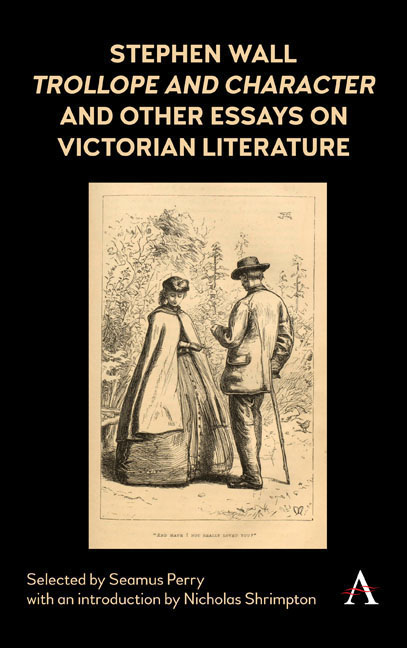Book contents
- Frontmatter
- Contents
- Preface
- Introduction: Stephen Wall and Trollope
- Part 1 On Trollope
- Part 2 On Dickens and Others
- 3 [George Eliot and Her Readers] [1965]
- 4 Jane Austen's Judgments [1968]
- 5 Dickens: New Words and Old Opinions [1969]
- 6 [Dickens and His Readers] [1970]
- 7 Dickens in 1970 [1971]
- 8 Annotated English Novels? [1982]
- 9 Affective Intentions [1985]
- 10 Virtuoso Variations [1987]
- 11 Going Beyond the Repertory [1990]
- 12 A Little Local Irritation [1998]
- Index
4 - Jane Austen's Judgments [1968]
from Part 2 - On Dickens and Others
Published online by Cambridge University Press: 25 July 2018
- Frontmatter
- Contents
- Preface
- Introduction: Stephen Wall and Trollope
- Part 1 On Trollope
- Part 2 On Dickens and Others
- 3 [George Eliot and Her Readers] [1965]
- 4 Jane Austen's Judgments [1968]
- 5 Dickens: New Words and Old Opinions [1969]
- 6 [Dickens and His Readers] [1970]
- 7 Dickens in 1970 [1971]
- 8 Annotated English Novels? [1982]
- 9 Affective Intentions [1985]
- 10 Virtuoso Variations [1987]
- 11 Going Beyond the Repertory [1990]
- 12 A Little Local Irritation [1998]
- Index
Summary
A Reading of ‘Mansfield Park’ has the subtitle An Essay in Critical Synthesis and, for a few alarming moments, it looks as if its career is going to include all the talents in an attempt to achieve ‘an approximation to a total reading’. Avrom Fleishman is an advocate of ‘perspectival flexibility’: the critic must be ready to accept different ways of approach to the individual work. Apart from the fact that many approaches are likely to prove mutually exclusive, a ‘total reading’ of a novel is hardly desirable even if it were possible, since it would simply exhaust the work. Although it may be virtuous to be tolerant of the views of others, the implications of what is here called ‘critical pluralism’ leads irresistibly to the abdication of judgement.
When Mr Fleishman gets down to it, his reading of Mansfield Park – for all its announced hospitality – turns out to be as argumentative as most people's and is the more interesting for that. His most absorbing chapter is on the relation of Mansfield Park to its social background. His main topics here include the religious values of the gentry about whom Jane Austen was writing: the contemporary political significance of Kotzebue's Lovers’ Vows, the play rehearsed at Mansfield during Sir Thomas Bertram's absence; and the economic pressures indicated by Sir Thomas's visit to Antigua. Such questions are well worth pursuit, but Mr Fleishman is sometimes too hasty in assuming that because the situations in Mansfield Park reflect the state of a certain class at a certain period it is also its author's intention to offer a critique of that class at that time.
The references to her novels in Jane Austen's letters are famous because they are so few, and her casual announcement that the subject of Mansfield Park was to be ordination has provoked much baffled comment: Mr Fleishman points to Sir Thomas Bertram's apparent inconsistency in criticizing absentee clergymen and yet allowing Edmund, at the end of the novel, to retain the parish of Thornton Lacey when he moves back to the parsonage at Mansfield. This is construed as an animadversion on the gentry's attitude to their spiritual responsibilities.
- Type
- Chapter
- Information
- Publisher: Anthem PressPrint publication year: 2018



